MAX14915為8通道高邊開關。它支持8通道驅動1A。微控制器兼容型串行外設接口(SPI)提供對許多診斷功能的訪問。本應用筆記提供了C代碼實現示例,包括設置、監控和診斷功能。
介紹
MAX14915/MAX14916集成8個高邊開關,提供輸出通道數、限流和診斷功能等特性。MAX14915為八通道高邊開關,具有豐富的診斷功能和每通道1A (典型值)電流限值。MAX14916可配置為八通道高邊開關(1A限流)或四通道高邊開關(2A限流)。這些器件具有單獨的通道熱保護、用于快速感應退磁的內部箝位以及用于開和關狀態的開路檢測。此外,還有一個集成的發光二極管(LED)矩陣,可顯示每個通道的狀態(開/關)以及故障條件。
本應用筆記介紹了一系列功能,為MAX14915/6編程提供簡單且經過驗證的解決方案(圖1)。它們是用C語言編寫的,應該很容易移植到任何常見的微控制器上。
本應用筆記主要展示了MAX14915的編程,但MAX14916的技術非常相似。
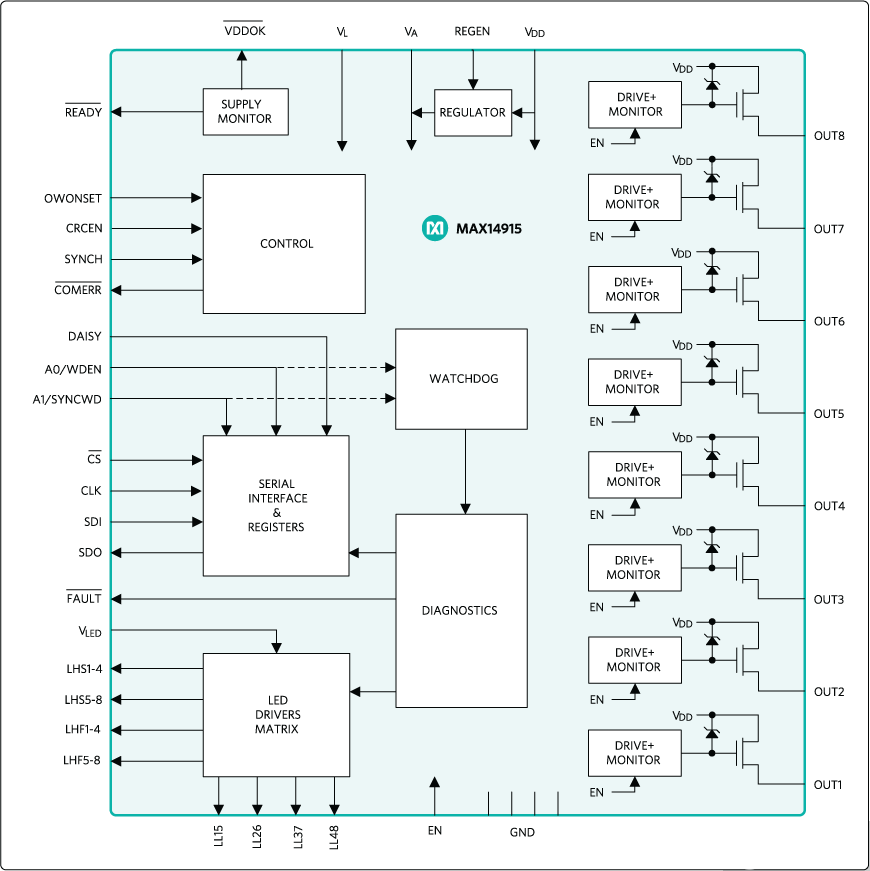
圖1.MAX14915功能框圖
MAX14915 SPI
MAX14915 SPI命令長度為16位(8位指令+8位數據),CRC禁用,如果使能CRC,則CRC8將增加8位。命令字節的 2 MSB 是芯片地址位,它們允許 4 個芯片共享相同的芯片選擇 (CS) 引腳。 SPI 命令結構如表 1 所示。MAX14915的SPI模式為CPOL = 0 (CLK空閑= 0),CPHA = 0 (上升沿/第一沿對數據進行采樣),數據/命令需要先以MSB時鐘。
| 芯片地址 | 突發位 |
注冊 - 地址 |
R/W | 數據 |
|---|---|---|---|---|
|
2 位 A[1:0] |
1 位 BRST[0] |
4 位 R[3:0] MSB 至 LSB |
1 位 RW[0] |
8 位 D[7:0] MSB 至 LSB |
有關SPI讀寫周期以及寄存器表和指令的更多詳細信息,請參考MAX14915和MAX14916數據資料。
圖1所示為MAX14915的主要功能塊。基本上,有8個輸出通道高邊驅動器、看門狗和診斷、一個16個LED(4x4)矩陣驅動器和邏輯端接口(SPI端口),用于訪問所有器件寄存器和硬件標志以進行診斷。
MAX14915 – 代碼應用示例
MAX14915設計用于支持終端設備的工業應用,如需要多個高邊開關的可編程邏輯控制器(PLC)。支持16通道組隔離的典型應用電路采用單個MAX14483數字隔離器,如圖2所示。
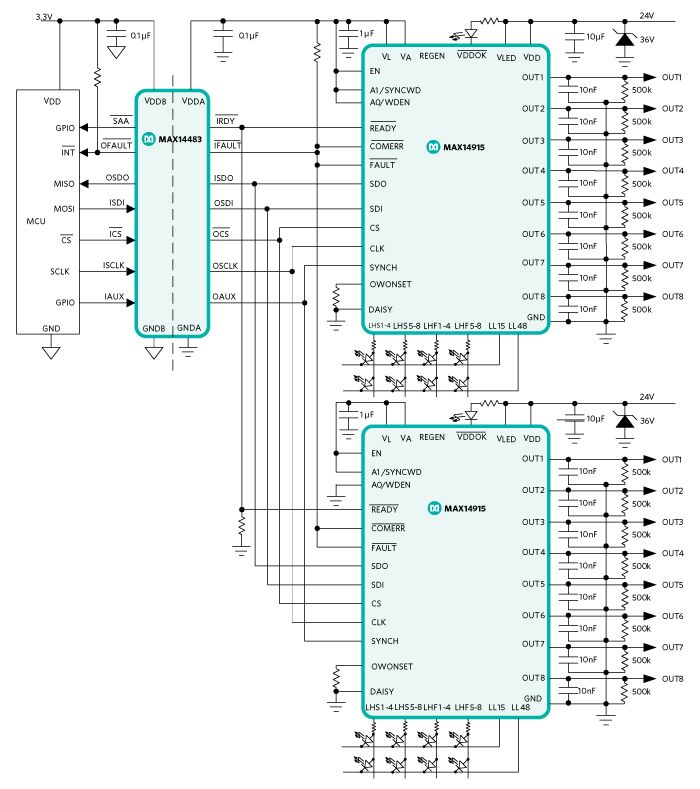
圖2.16通道高邊開關組隔離。
每個單獨的輸出可以驅動高達 1A 的電流,并具有單獨的開路、過流和過溫診斷
為了簡化需要電流隔離的系統,MAX14915支持菊花鏈和尋址SPI模式。
注意: 某些診斷功能僅在直接 SPI 或尋址 SPI 模式下可用,但在菊花鏈模式下不可用。詳情請參考MAX14915數據資料。
源代碼
本應用筆記提供了C源代碼示例,主要提供驅動器功能,用于訪問MAX14915中的多個寄存器,以實現配置、控制和診斷功能。所有軟件均使用MAX14915評估板進行實現和測試。客戶應僅將本文檔中的功能用作參考,并根據其應用程序中的微控制器和硬件實現設計自己的固件/軟件。
寄存器地址定義:
#define REG_SetOUT 0x00 #define REG_SetFLED 0x01 #define REG_SetSLED 0x02 #define REG_Interupt 0x03 #define REG_OvlChF 0x04 #define REG_CurrLimF 0x05 #define REG_OwOffChF 0x06 #define REG_OwOnChF 0x07 #define REG_ShtVDDChF 0x08 #define REG_GlobalErr 0x09 #define REG_OwOffEn 0x0a #define REG_OwOnEn 0x0b #define REG_ShtVddEn 0x0c #define REG_Config1 0x0d #define REG_Config2 0x0e #define REG_Mask 0x0f
其他定義:
#define OUT1 0x01 #define OUT2 0x02 #define OUT3 0x04 #define OUT4 0x08 #define OUT5 0x10 #define OUT6 0x20 #define OUT7 0x40 #define OUT8 0x80 #define GLB_ShrtVDD 0x20 #define GLB_OWOnF 0x10 #define GLB_OWOffF 0x08 #define GLB_CurrLim 0x04 #define GLB_OverLdF 0x02 #define GLB_GloblF 0x01 bool CRC_Enabled = true; // if pin CRCEN = high, then this must be true //bool CRC_Enabled = false; // if pin CRCEN = low, then this must be false const int CRC_ERROR = 0xffff;
該測試程序等待MAX14915,直到它沒有報告任何故障,例如在上電MAX14915報告上電復位條件之后。接下來,對MAX14915進行初始化,以便報告任何故障,作為典型上電自檢程序的一部分,二進制計數器在8個通道上運行并打印故障條件。
void test() { uint8_t ADR = 0; // MAX14915 Chip-Address Allows multiple Chips with 1 Chip-Select uint16_t loop_count = 0; // Check status, only continue if All OK. uint16_t fault = 0xffff; while (fault != 0) // Halt until MAX14915 has no faults { fault = MAX14915_Init(ADR); if ( (fault) != 0) MAX14915_Identify_Error(ADR, fault); // check for errors if any bit is set } // Writes a binary counter to the 8 Ports // Checks for any errors and prints them while (1) { printf("Writing %i\r\n", loop_count); uint16_t w_result = MAX14915_write_register(ADR, REG_SetOUT, loop_count); w_result = w_result & 0x3fff; // ignore the 2 MSBs, they're not used printf("W-Result 0x%04x\r\n", w_result); if ( (w_result) != 0) MAX14915_Identify_Error(ADR, w_result); // only check if any bit is set delay_ms(100); loop_count++; if (loop_count > 255) loop_count = 0; } }
這些是初始化和使用MAX14915所需的功能,包括寄存器讀寫操作、CRC代碼生成和解碼以及錯誤標志輪詢。
//******************************************************************** //* //* Function: MAX14915_Init //* Description: Initialize MAX14915 //* //* Input: //* Chip_Address: Chip address selected by pins A1 and A0 //* //* Output, none //* Initializes the device after power-up //* //* if CRC is enabled, then crc5 is sent accordingly //* //********************************************************************/ uint16_t MAX14915_Init(uint8_t Chip_Address) { // ********************************************************************************** // * D07 * D06 * D05 * D04 ** D03 * D02 * D01 * D00 * // * ComErrM *SuplErrM * VddOKM * ShtVddM ** OWOnM * OWOffM * OWOffM * OverLdM * // * 1 * 0 * 0 * 0 ** 0 * 0 * 0 * 0 * // ********************************************************************************** // -> 0x80 // All warnings enabled, just Watchdog off uint16_t result = MAX14915_write_register(Chip_Address, REG_Mask, 0x80); // ********************************************************************************** // * D07 * D06 * D05 * D04 ** D03 * D02 * D01 * D00 * // * LEDCLim * FLatchEn*FiltrLong*FFilterEn**FLEDStr1 *FLEDStr0 * SLEDSet * FLEDSet * // * 0 * 1 * 0 * 1 ** 0 * 0 * 0 * 0 * // ********************************************************************************** // -> 0x50 // Enable Status and Fault LEDs // Keep Fault-Latch and Filter-Blanking on result |= MAX14915_write_register(Chip_Address, REG_Config1, 0x50); // enable Open-Wire when off detection on all Channels // this only works if a load is connected on all channels // Maybe should be handled by the Application? result |= MAX14915_write_register(Chip_Address, REG_OwOffEn, 0xff); // enable Open-Wire when on detection on all Channels // this only works if a load is connected on all channels // Maybe should be handled by the Application? result |= MAX14915_write_register(Chip_Address, REG_OwOnEn, 0xff); // enable Short to VDD detection on all Channels // this only works if a load is connected on all channels // Maybe should be handled by the Application? result |= MAX14915_write_register(Chip_Address, REG_ShtVddEn, 0xff); return result & 0x3fff; // discard the 2 MSBs, since they're unused } //******************************************************************** //* //* Function: MAX14915_write_register //* Description: Write one Register to MAX14915 //* //* Input: //* Chip_Address: Chip address selected by pins A1 and A0 //* Register-Address take from definitions in header-file //* data Data to be written into the register //* //* Output, 16bit result: //* MSB 8-bits = Global Error uint8_t //* LSB 8-bits = Fault bits F8 to F1 //* //* if CRC is enabled, then crc5 is sent accordingly //* //********************************************************************/ uint16_t MAX14915_write_register(uint8_t Chip_Address, uint8_t Register_Address, uint8_t data) { // Construct the SPI uint8_t to transmit uint8_t CHIP_ADR = (uint8_t) (Chip_Address<<6); // 2 MSBs are the Chip Address (A1 and A0) uint8_t BRST = 0; // 0 = no burst read; 1 = burst read -> 0x20 to set this bit uint8_t R_ADR = (uint8_t) (Register_Address<<1); // Register Address uint8_t command = (uint8_t) (CHIP_ADR | BRST | R_ADR | 1); // construct SPI Command uint8_t. LSB = 1 for Write-Command // END Construct the SPI uint8_t to transmit MAX14915_CS_Low(); // Write Command-uint8_t, Receive the Global Error uint8_t at the same time uint8_t GLOB_ERROR = MAX14915_SPI_RW_8bit(command); // Write Data-uint8_t, Receive the Individual Fault-Bits at the same time uint8_t FAULT_BITS = MAX14915_SPI_RW_8bit(data); if (CRC_Enabled == true) { uint8_t crc5_checksum; crc5_checksum = MAX14915_crc5_encode_2byte(command, data); MAX14915_SPI_RW_8bit(crc5_checksum); } MAX14915_CS_High(); return (uint16_t) ((GLOB_ERROR << 8) | FAULT_BITS);; } //******************************************************************** //* //* Function: MAX14915_read_register //* Description: Read one Register from MAX14915 //* //* Input: //* Chip_Address: Chip address selected by pins A1 and A0 //* Register-Address take from definitions in header-file //* data Data to be written into the register //* //* //* Output, 16bit result: //* MSB 8-bits = Global Error uint8_t //* LSB 8-bits = Register content 8-bits //* //* if CRC is enabled and there was a CRC error, then Output is CRC_ERROR //* //********************************************************************/ uint16_t MAX14915_read_register (uint8_t Chip_Address, uint8_t Register_Address) { // Construct the SPI uint8_t to transmit uint8_t CHIP_ADR = (uint8_t) (Chip_Address<<6); // 2 MSBs are the Chip Address (A1 and A0) uint8_t BRST = 0; // 0 = no burst read; 1 = burst read -> 0x20 to set this bit uint8_t R_ADR = (uint8_t) (Register_Address<<1); // Register Address uint8_t command = (uint8_t) (CHIP_ADR | BRST | R_ADR); // construct SPI Command uint8_t. LSB = 0 for Read-Command // END Construct the SPI uint8_t to transmit MAX14915_CS_Low(); // Write Command-uint8_t, Receive the Global Error uint8_t at the same time uint8_t GLOB_ERROR = MAX14915_SPI_RW_8bit(command); GLOB_ERROR = GLOB_ERROR & 0x3f; // Discard the 2 MSBs, they're not used // Write Data-uint8_t, Receive the Individual Fault-Bits at the same time uint8_t data = MAX14915_SPI_RW_8bit(0); if (CRC_Enabled == true) { uint8_t crc5_read; uint8_t crc5_calc; crc5_calc = MAX14915_crc5_decode_2byte(GLOB_ERROR, data); crc5_read = MAX14915_SPI_RW_8bit(MAX14915_crc5_encode_2byte(command,0)); if (crc5_read != crc5_calc) System_Handle_CRC_Error(Chip_Address); } MAX14915_CS_High(); return (uint16_t) ((GLOB_ERROR << 8) | data); } //******************************************************************** //* //* Function: MAX14915_crc5encode_2byte //* Description: Generates CRC5 byte for 2 byte-Command //* this is needed for WRITE commands //* //* Input: //* byte1: Usually Command Byte //* byte2: Byte written to MAX14915 //* //* Output, 8bit result: //* CRC5 of the 2 Bytes //* //********************************************************************/ uint8_t MAX14915_crc5_encode_2byte(uint8_t byte1, uint8_t byte2) { uint8_t crc5_start = 0x1f; uint8_t crc5_poly = 0x15; uint8_t crc_result = crc5_start; // byte1 for (int i=0; i<8; i++) { if( ((( byte1>>(7-i) )&0x01) ^ ((crc_result & 0x10)>>4)) > 0 ) { crc_result = (uint8_t) (crc5_poly ^ ((crc_result<<1) & 0x1f)); } else { crc_result = (uint8_t)((crc_result<<1) & 0x1f); } } // END byte1 // byte2 for (int i=0; i<8; i++) { if( ((( byte2>>(7-i) )&0x01) ^ ((crc_result & 0x10)>>4)) > 0 ) { crc_result = (uint8_t) (crc5_poly ^ ((crc_result<<1) & 0x1f)); } else { crc_result = (uint8_t)((crc_result<<1) & 0x1f); } } // END byte2 // 3 extra bits set to zero uint8_t uint8_t3=0x00; for (int i=0; i<3; i++) { if( ((( uint8_t3>>(7-i) )&0x01) ^ ((crc_result & 0x10)>>4)) > 0 ) { crc_result = (uint8_t) (crc5_poly ^ ((crc_result<<1) & 0x1f)); } else { crc_result = (uint8_t)((crc_result<<1) & 0x1f); } } // END 3 extra bits set to zero return crc_result; } //******************************************************************** //* //* Function: MAX14915_crc5_decode_2byte //* Description: Decodes CRC5 byte for 2 byte-Command //* this is needed for READ commands //* //* Input: //* byte1: Usually Command Byte //* byte2: byte read from MAX14915 //* //* Output, 8bit result: //* CRC5 of the 2 Bytes //* //********************************************************************/ uint8_t MAX14915_crc5_decode_2byte(uint8_t byte1, uint8_t byte2) { uint8_t crc5_start = 0x1f; uint8_t crc5_poly = 0x15; uint8_t crc_result = crc5_start; // BYTE1 for (int i=2; i<8; i++) { if( ((( byte1>>(7-i) )&0x01) ^ ((crc_result & 0x10)>>4)) > 0 ) // IF(XOR(C6;BITAND(D5;2^4)/2^4) { // BITXOR($D$1;BITAND((D5*2);31)) crc_result = (uint8_t) (crc5_poly ^ ((crc_result<<1) & 0x1f)); } else { crc_result = (uint8_t)((crc_result<<1) & 0x1f); } } // END BYTE1 // BYTE2 for (int i=0; i<8; i++) { if( ((( byte2>>(7-i) )&0x01) ^ ((crc_result & 0x10)>>4)) > 0 ) // IF(XOR(C6;BITAND(D5;2^4)/2^4) { // BITXOR($D$1;BITAND((D5*2);31)) crc_result = (uint8_t) (crc5_poly ^ ((crc_result<<1) & 0x1f)); } else { crc_result = (uint8_t)((crc_result<<1) & 0x1f); } } // END BYTE2 // 3 extra bits set to zero uint8_t byte3=0x00; for (int i=0; i<3; i++) { if( ((( byte3>>(7-i) )&0x01) ^ ((crc_result & 0x10)>>4)) > 0 ) // IF(XOR(C6;BITAND(D5;2^4)/2^4) { // BITXOR($D$1;BITAND((D5*2);31)) crc_result = (uint8_t) (crc5_poly ^ ((crc_result<<1) & 0x1f)); } else { crc_result = (uint8_t)((crc_result<<1) & 0x1f); } } // END 3 extra bits set to zero return crc_result; } //******************************************************************** //* //* Function: MAX14915_Identify_Error //* Description: This should be called if one of the Global-Error bits //* or Fault bits is set //* This function identifies the error and calls //* //* Input: //* uint16_t: MS-uint8_t = Global Errors from SPI transfer //* LS-uint8_t = Channel Fault bits from SPI transfer //* //* Output: //* none, will call System Level function to handle the error //* //********************************************************************/ void MAX14915_Identify_Error(uint8_t Chip_Address, uint16_t ERROR_INFO) { uint8_t GlobalERR = (uint8_t) ((ERROR_INFO>>8) & 0xff); // MSB 8-bits = Global Error uint8_t uint8_t CH_FAULT = (uint8_t) ((ERROR_INFO) & 0xff); // LSB 8-bits = Fault bits F8 to F1 if ((GlobalERR & GLB_GloblF) != 0) System_Handle_Global_fault(Chip_Address); // If no Channel Fault, then no further checking is needed: if (CH_FAULT == 0) return; // if only one single fault exists, then Error-Type is already known by Global_Error_uint8_t if ( (CH_FAULT == OUT1) || (CH_FAULT == OUT2) || (CH_FAULT == OUT3) || (CH_FAULT == OUT4) || (CH_FAULT == OUT5) || (CH_FAULT == OUT6) || (CH_FAULT == OUT7) || (CH_FAULT == OUT8) ) { uint8_t ch_number = MAX14915_decode_channel_number(CH_FAULT); if ((GlobalERR & GLB_ShrtVDD) != 0) System_Handle_Short_to_VDD_CH(ch_number, Chip_Address); if ((GlobalERR & GLB_OWOnF) != 0) System_Handle_OpenWire_CH(ch_number, Chip_Address); if ((GlobalERR & GLB_OWOffF) != 0) System_Handle_OpenWire_CH(ch_number, Chip_Address); if ((GlobalERR & GLB_CurrLim) != 0) System_Handle_Current_Limit_CH(ch_number, Chip_Address); if ((GlobalERR & GLB_OverLdF) != 0) System_Handle_Overload_CH(ch_number, Chip_Address); } else { // there is more than 1 error present // so we need to check each channel // first read each Error Register: uint16_t OvlChF = MAX14915_read_register (Chip_Address, REG_OvlChF); uint16_t CurrLim = MAX14915_read_register (Chip_Address, REG_CurrLimF); uint16_t OwOffChF = MAX14915_read_register (Chip_Address, REG_OwOffChF); uint16_t OwOnChF = MAX14915_read_register (Chip_Address, REG_OwOnChF); uint16_t ShtVDDChF = MAX14915_read_register (Chip_Address, REG_ShtVDDChF); if ((OvlChF & OUT1) != 0) System_Handle_Overload_CH(1, Chip_Address); if ((OvlChF & OUT2) != 0) System_Handle_Overload_CH(2, Chip_Address); if ((OvlChF & OUT3) != 0) System_Handle_Overload_CH(3, Chip_Address); if ((OvlChF & OUT4) != 0) System_Handle_Overload_CH(4, Chip_Address); if ((OvlChF & OUT5) != 0) System_Handle_Overload_CH(5, Chip_Address); if ((OvlChF & OUT6) != 0) System_Handle_Overload_CH(6, Chip_Address); if ((OvlChF & OUT7) != 0) System_Handle_Overload_CH(7, Chip_Address); if ((OvlChF & OUT8) != 0) System_Handle_Overload_CH(8, Chip_Address); if ((CurrLim & OUT1) != 0) System_Handle_Current_Limit_CH(1, Chip_Address); if ((CurrLim & OUT2) != 0) System_Handle_Current_Limit_CH(2, Chip_Address); if ((CurrLim & OUT3) != 0) System_Handle_Current_Limit_CH(3, Chip_Address); if ((CurrLim & OUT4) != 0) System_Handle_Current_Limit_CH(4, Chip_Address); if ((CurrLim & OUT5) != 0) System_Handle_Current_Limit_CH(5, Chip_Address); if ((CurrLim & OUT6) != 0) System_Handle_Current_Limit_CH(6, Chip_Address); if ((CurrLim & OUT7) != 0) System_Handle_Current_Limit_CH(7, Chip_Address); if ((CurrLim & OUT8) != 0) System_Handle_Current_Limit_CH(8, Chip_Address); if ((OwOffChF & OUT1) != 0) System_Handle_OpenWire_CH(1, Chip_Address); if ((OwOffChF & OUT2) != 0) System_Handle_OpenWire_CH(2, Chip_Address); if ((OwOffChF & OUT3) != 0) System_Handle_OpenWire_CH(3, Chip_Address); if ((OwOffChF & OUT4) != 0) System_Handle_OpenWire_CH(4, Chip_Address); if ((OwOffChF & OUT5) != 0) System_Handle_OpenWire_CH(5, Chip_Address); if ((OwOffChF & OUT6) != 0) System_Handle_OpenWire_CH(6, Chip_Address); if ((OwOffChF & OUT7) != 0) System_Handle_OpenWire_CH(7, Chip_Address); if ((OwOffChF & OUT8) != 0) System_Handle_OpenWire_CH(8, Chip_Address); if ((OwOnChF & OUT1) != 0) System_Handle_OpenWire_CH(1, Chip_Address); if ((OwOnChF & OUT2) != 0) System_Handle_OpenWire_CH(2, Chip_Address); if ((OwOnChF & OUT3) != 0) System_Handle_OpenWire_CH(3, Chip_Address); if ((OwOnChF & OUT4) != 0) System_Handle_OpenWire_CH(4, Chip_Address); if ((OwOnChF & OUT5) != 0) System_Handle_OpenWire_CH(5, Chip_Address); if ((OwOnChF & OUT6) != 0) System_Handle_OpenWire_CH(6, Chip_Address); if ((OwOnChF & OUT7) != 0) System_Handle_OpenWire_CH(7, Chip_Address); if ((OwOnChF & OUT8) != 0) System_Handle_OpenWire_CH(8, Chip_Address); if ((ShtVDDChF & OUT1) != 0) System_Handle_Short_to_VDD_CH(1, Chip_Address); if ((ShtVDDChF & OUT2) != 0) System_Handle_Short_to_VDD_CH(2, Chip_Address); if ((ShtVDDChF & OUT3) != 0) System_Handle_Short_to_VDD_CH(3, Chip_Address); if ((ShtVDDChF & OUT4) != 0) System_Handle_Short_to_VDD_CH(4, Chip_Address); if ((ShtVDDChF & OUT5) != 0) System_Handle_Short_to_VDD_CH(5, Chip_Address); if ((ShtVDDChF & OUT6) != 0) System_Handle_Short_to_VDD_CH(6, Chip_Address); if ((ShtVDDChF & OUT7) != 0) System_Handle_Short_to_VDD_CH(7, Chip_Address); if ((ShtVDDChF & OUT8) != 0) System_Handle_Short_to_VDD_CH(8, Chip_Address); } } uint8_t MAX14915_decode_channel_number(uint8_t CH_binary) { if ((CH_binary & OUT1) != 0) return 1; if ((CH_binary & OUT2) != 0) return 2; if ((CH_binary & OUT3) != 0) return 3; if ((CH_binary & OUT4) != 0) return 4; if ((CH_binary & OUT5) != 0) return 5; if ((CH_binary & OUT6) != 0) return 6; if ((CH_binary & OUT7) != 0) return 7; if ((CH_binary & OUT8) != 0) return 8; return 0; }
這些功能顯示了MAX14915的診斷特性。在此示例中,僅打印錯誤條件。真正的應用程序可能必須采取進一步的操作:
void System_Handle_Overload_CH(uint8_t Channel, uint8_t Chip_Address)
{
// "Channel" is overloaded
// System needs to handle over-load on "Channel"
// Print to the User?
// Just switch off?
printf("MAX14915 %i - Channel %i is overloaded\r\n", Chip_Address, Channel);
// Application actions
MAX14915_read_register (Chip_Address, REG_OvlChF); // read to clear the flag
// if error persists, the flag
// will come back immediately
}
void System_Handle_Current_Limit_CH(uint8_t Channel, uint8_t Chip_Address)
{
// "Channel" is in current limiting mode
// Does the system have to do anything in this case?
// Print to the User?
// Just switch off?
printf("MAX14915 %i - Channel %i is in Current Limiting mode\r\n", Chip_Address, Channel);
// Application actions
MAX14915_read_register (Chip_Address, REG_CurrLimF); // read to clear the flag
// if error persists, the flag
// will come back immediately
}
void System_Handle_OpenWire_CH(uint8_t Channel, uint8_t Chip_Address)
{
// "Channel" is open wire
// Does the system have to do anything in this case?
// Print to the User?
printf("MAX14915 %i - Channel %i is Open Wire\r\n", Chip_Address, Channel);
// Application actions
MAX14915_read_register (Chip_Address, REG_OwOnChF);
MAX14915_read_register (Chip_Address, REG_OwOffChF); // read to clear the flag
// if error persists, the flag
// will come back immediately
}
void System_Handle_Short_to_VDD_CH(uint8_t Channel, uint8_t Chip_Address)
{
// "Channel" is shorted to VDD
// Does the system have to do anything in this case?
// Print to the User?
// Just switch off?
printf("MAX14915 %i - Channel %i is shorted to VDD\r\n", Chip_Address, Channel);
// Application actions
MAX14915_read_register (Chip_Address, REG_ShtVDDChF); // read to clear the flag
// if error persists, the flag
// will come back immediately
}
void System_Handle_Global_fault(uint8_t Chip_Address)
{
// read Global Error Register
uint16_t global_error = MAX14915_read_register (Chip_Address, REG_GlobalErr);
if ((global_error & 0x02) != 0) printf("MAX14915 %i Logic Undervoltage\r\n", Chip_Address);
if ((global_error & 0x04) != 0) printf("MAX14915 %i VDD not good (below 16V)\r\n", Chip_Address);
if ((global_error & 0x08) != 0) printf("MAX14915 %i VDD warning (below 13V)\r\n", Chip_Address);
if ((global_error & 0x10) != 0) printf("MAX14915 %i VDD Undervoltage (below 8V)\r\n", Chip_Address);
if ((global_error & 0x20) != 0) printf("MAX14915 %i Thermal Shutdown\r\n", Chip_Address);
if ((global_error & 0x40) != 0) printf("MAX14915 %i SYNCH Error\r\n", Chip_Address);
if ((global_error & 0x80) != 0) printf("MAX14915 %i Watchdog Error\r\n", Chip_Address);
if ((global_error & 0x01) != 0)
{
// After a power-on reset all registers are in reset state
// -> we need to re-initialize to our settings
MAX14915_Init(Chip_Address);
printf("MAX14915 %i Power-up Reset detected\r\n", Chip_Address);
}
}
void System_Handle_CRC_Error(uint8_t Chip_Address)
{
// There was a CRC error
printf("MAX14915 %i - CRC Error!\r\n", Chip_Address);
// The Application needs to react here
MAX14915_read_register (Chip_Address, REG_GlobalErr); // read to clear the flag
// if error persists, the flag
// will come back immediately
}
結論
本應用筆記介紹了如何對MAX14915進行編程以驅動輸出和診斷故障條件。該代碼使用MAX14915EVKIT進行測試。工程師可以使用本應用筆記中提到的C代碼示例,快速輕松地實現常用微控制器和MAX14915之間的接口。
審核編輯:郭婷
-
微控制器
+關注
關注
48文章
7574瀏覽量
151707 -
芯片
+關注
關注
456文章
51004瀏覽量
425208 -
SPI
+關注
關注
17文章
1715瀏覽量
91830
發布評論請先 登錄
相關推薦
16通道高壓模擬開關MAX14800電子資料
MAX306, MAX307 高精度、16通道/雙8通道、高
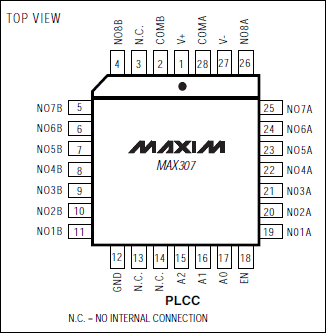
MAX16070, MAX16071 12通道/8通道、閃存
MAX11044,MAX11045,MAX11046 4/6/8通道16位同時采樣ADC
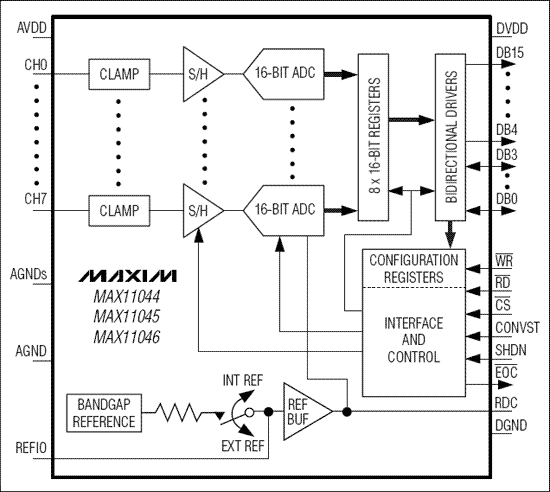




 如何對MAX14915/16進行編程 - 8通道高邊開關
如何對MAX14915/16進行編程 - 8通道高邊開關


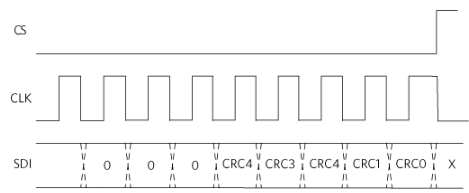
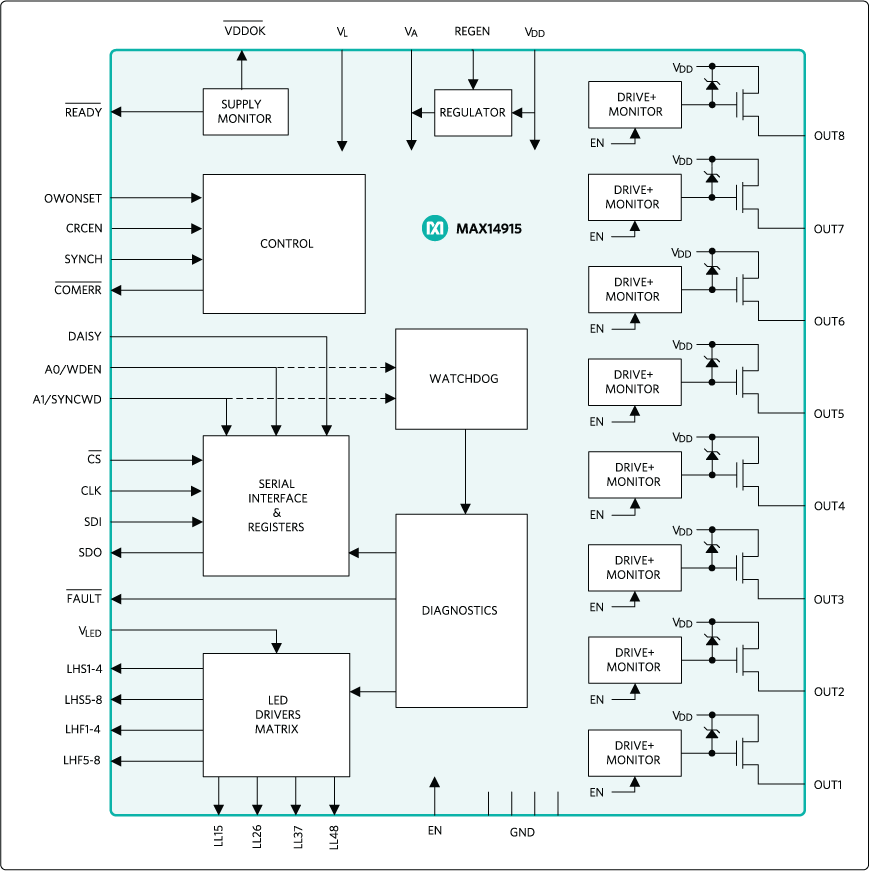










評論